My aim with this article is to analyze the ideas of Nationalism, Patriotism and Internationalism and the various motivations for these ideas and how these ideas are not sufficient to explain the Indian mind nor do these ideas encapsulate the Indian ethos. I will critically analyze the ideas of western Nationalism(ethnic, civic, territorial), Patriotism and Internationalism and elucidate why I think Cultural Nationalism/Civilizationalism is the natural choice for Bharat-Ganarajyam.
Let’s first peruse what nationalism means in a western context and it’s origin in Europe during the French Revolution, and its evolution during the Napoleonic Wars. Late 18th century western nationalism was actually a left wing invention as the idea of nation-state is an imagined one. A nation is not a reality as borders are not natural and are artificial, and therefore the making of a nation state is always a very violent process like the process of the formation of France and Italy as nation-state’s under the banner of a common language and ethnicity.
Now the natural question is why was the process of the formation of nation-state’s so violent in the west?
It is due to the numerous ethnic conflicts which have happened over the course of history in Europe. If you call the history of Europe, a history of bloodshed and violence you would not be amiss. If you have a cursory understanding of western history, you will see that in the west it is the state that forms the nation. In the west, before the coming of the nation-state there were what we call dynasties like the Habsburgs, House of Capet and Bourbon, Hohenzollern and the Romanovs who used to intermarry within each others houses, and as these were the old monarchial houses of those times, and therefore were the elites, the only way to challenge those who were in nature transcontinental, French revolutionaries used nationalism to assert their national right to self determination based on a common language, traditions, ethnicity and racial groups. For eg: British nationalism was based on Anglo-Saxon racial/ethnic groups and the English language. Whenever these ‘formations’ take place, it is followed by a considerable amount of violence. For having the same ethnic language the French Revolutionaries standardized the French language and crushed any linguistic diversity the French Language possessed. Even in Italy during the time of their unification we know that the Italian language was not standardized and majority of their population did not speak Italian of a similar kind but the language had many regional dialects. For example: As a Marathi the language has many different nuances across the regions of Vidarbha, Konkan, Marathwada, Pune and Nashik. I am sure other Indian languages also have these which make them beautiful but for the cause of the nation-state this diversity was systematically crushed, it shall give them a semblance of political unity but also will lead to a lot of opposition which leads to fear, which leads to anger and which will culminate into violence. Even in modern times we have seen that language unity is not a guarantee of unity as we have seen in Spain and the issue it has with the region of Catalonia which is mostly economic. Here, I criticize the idea of Western Nationalism based on language as here we do see how they entire dialects and regional variations of language are crushed for a semblance of political unity and sometimes even that is not enough and the loss of dialects leads to loss of knowledge, culture and traditions which I do not feel is something to be sacrificed at the altar of the nation-state.
The idea of territorial nationalism is in itself is insufficient because it does not fulfill our requirements because territorial nationalism is similar to civic nationalism and therefore is based on the concept of citizenship, territory and actively disincentivizes the showcasing of the culture of the nation as the primary crux of its identity and tokenizes it which eventually leads to cultural degradation and extinction. It also sees the constitution as the crux of the identity of the nation-state and its citizenry, which in itself cannot be seen as a marker for identity, as, it not only is a rulebook, but in our case actively against the interest of the culture of the majority as it actively discriminates against it in some of its provisions. Our constitution is not a document whose basic values have any indigenous component to it. While the constituent assembly debates are a treat to read, we would be mistaken to think that this constitution has any relation to our civilization. It is similar to the constitution adopted after the 1935 government of India act, therefore not only colonial but western in nature. I do not advocate for a overhauling of the constitution or for it to be thrown, but argue that it cannot be the basis for Bharatiya nationalism.
Now I shall come to patriotism/ethnic nationalism:
Many people in the west claim to be patriots instead of nationalists. Now the word ‘patriot’ itself come from the word patriarchy and it means ‘from one’s father land’ with the notion of blood and soil or to say the land where my clan lives and the land they tilled and is not the same as nationalism because the motivations for both are different. A patriot is defending the country is not because of a obligation towards the Matrubhumi/Pitrabhumi but because he does not want to lose the land his ancestors tilled and he owns. Now patriotism in its extreme is sub nationalism as a Tamil Nationalist wants Tamil Nadu to become a nation as he believes it is good enough to become a nation while a Indian Patriot belonging to Tamil Nadu will fight for the nation state so as to save his land which seems more selfish due to material gains rather than a sense of duty while nationalism is also selfishness but it is for a sense of belongingness than possessiveness or rather a responsibility towards the nation-state rather than a right to till the land his fathers tilled. Patriotism according to me is a rural idea and a very inferior one as it cannot be used as a unifying feeling for something greater than yourself but for the land you own, not because you share a common land with others. Ethnic Nationalism is not that different from patriotism as they both share the belief of blood and soil and for a country like ours it is fundamentally useless as we are not one ethnicity or race, it also leads to cultural stagnation because it feels that the ethnic group these nationalists belong to are the superior ones and due to these supposed superiority of theirs, their innovative spirit is crushed.
The idea of any kind of western construct of nationalism is in essence lacking in explaining Indian realities and our fundamental unity which is not based on a constitution, language or race/ethnicity. If these constructs of nationalism are applied on India, they will lead to balkanization or cultural extinction. These constructs are better suited to western states and these ideas will be used to power sub-nationalism which is negative consequence for Bharat Ganarajya.
Marxism, Internationalism and Anti Nationals:
Marxists believe in the notion of Internationalism, and they believe so because they want to remove all inequality from the world and then establish equity or equality of outcome and which according to theory shall lead them to a dictatorship of the proletariat and as Marx claimed in his most famous book the communist manifesto “THE LABOR CLASS SHALL KNOW NO NATIONAL BOUNDARIES” and many other quotes which I have in the kindle version of the book as I own it.
Now the quotes ad verbatim and my remarks on them:
‘The history of all hitherto existing society is the history of class struggle’
Now if we see here by the time Marx wrote this the hundred years war between the French and English had been over which was not related to any class warfare but here their prophet seems to have a reductionist approach to any conflict of any nature and reduce it to a class one and therefore seems to have given up the thought of it being a conflict between two nation states/empires and we see that he seems to be a person who does not believe in the significance or existence of the nation-state. He seems to ignore that in most conflicts the so called Bourgeois and the Proletariat of one nation-state unite to against the Bourgeois and the Proletariat of another, on the basis of national identity. The two world wars are a testament to this fact and so was the failure of the great experiment called Soviet Union, especially the Eastern Block.
2.’Though not in substance, yet in form, the struggle of the proletariat with the bourgeoisie is at first a national struggle. The proletariat of each country must, of course, first settle all matters with its bourgeoisie’
He means kill them. It will not be peaceful or bloodless. What is being conveyed here is that all empires/republics shall first be taken over by the proletariat(communists) of those countries and then they shall all come together to form the communist International.
3.’The Communists are distinguished from the other working class parties by this only: (1) In the National Struggles of the proletarians of different countries, they point out and bring to the front the common interests of the entire proletariat, independently of all nationality. (2) In the various stages of development which the struggle of working class against the bourgeoise has to pass through, they always and everywhere represent the interests of the movement as a whole.’
4.’The communists are further reproached with desiring to abolish countries and nationality. The working men have no country. We must acquire political “supremacy”.
Now, there are certain aspects around communists and communism that even the Indian Right has digested without giving lot of thought. To counter Indian marxists they say that Chinese, Vietnamese and Soviet communists were nationalists and therefore their opposition to Indian marxists comes because they are not nationalistic, there of course are other reasons. This is patently false. The biggest Soviet communist leader was Lenin, he was a German agent who was sent in the Russian empire to wreak havoc and induce internal instability to make sure Russia pulls out of the Great War. The anthem of the Soviet Union used to be L’Internationale and was only changed during the second world war to rouse the national spirit and the spirit of duty towards the motherland. Even within the Soviet Union’s communist party, there was an ongoing ideological split between the Stalinists and Trotskyists.
Trotsky: Trotsky was a proponent of “permanent revolution,” believing that socialism could not succeed in a single country and that the success of socialism required a worldwide proletarian revolution. He argued for international cooperation and spreading the revolution to other countries to prevent the Soviet Union from becoming isolated.
Stalin: Stalin introduced the concept of “socialism in one country,” emphasizing the need to consolidate socialism within the borders of the Soviet Union before attempting to spread it internationally. This approach was more nationalist and focused on building a strong socialist state in the USSR. So, the Soviet communists only became nationalistic enough when they got a country under communism. The Chinese communists did not help the KMT fight the Japanese and only came later to take away the leftover of China from the KMT. The Vietnamese had north Vietnam as a communist country.
And I rest my case to why marxists are anti-national ideologically as they believe that the existence of the nation state is a roadblock to their ‘utopian’ aims and therefore it has to vanish by itself or be obliterated from existence.
INTERNATIONALISM(Liberal)
Liberal internationalists believe that the idea of the nation state is a old idea and also a roadblock to world peace and human development and therefore want the dissolution of any state including the Bhartiya state as they believe it to be a archaic relic of old times. They believe that a one size fits all form of government or political system shall suffice and be good enough for the entire globe and want to push their own liberal values as global values and in that not only want the gradual dilution of the nation-state, but also the gradual annihilation of the cultures of all these nation-states. For their utopian dream to come true, they require a cultural genocide. The end goal of Internationalism is to make a Utopia encompassing the entire world and it shall only happen when the nation-states cease to exist in their entirety. They want a global homogeneous culture which will be stepped into consumerism and hedonism and such a culture will have many regional variations carrying the components of the local culture which have been digested and stripped of their original meaning.
I treat global citizens with disdain because by the very nature of the word ‘Global citizens’, you have marked yourself as a person who believes in values which do not represent a nation-state but the entire globe, but it can also be said that there are no global values, but global ideologies and such ideologies are detrimental to the existence of the nation state and therefore makes you a threat to Bharat-Ganarajya. You are a citizen of nowhere and should be treated as such.
Cultural Nationalism/Civilizationalism:
Indian cultural nationalists argue that while our territory is enshrined in our constitution it is also enshrined in our sacred texts like the Vishnu Purana where these lines are given regarding Bharatvarsh
Now I shall discuss why Indian cultural Nationalism is imperative to the existence of Bharat Ganarajya.
Now when we look at the map above, we see the mother goddess or the Motherland to which we all cherish, seek to protect and if required expand.
Certain groups feel that the Indian nationality is an oppressive nationality as it suppresses other real nationalities based on linguistic, ethnic and cultural lines and the Indian State which keeps this entity together is therefore a evil Fascist Hindu State. This is why I feel we need to reject these western constructs around nationhood and nationalism, because according to them we cannot be a nation. This is because our country is really diverse and what is keeping it together is Indian cultural nationalism which unlike European nationalism does not uniformize people by stomping out diversity of any kind but celebrates it and this is not because Indian Nationalism is Anti Colonial like a certain thought leaders of our have argued but unlike other nationalisms it is supported, nourished and backed up by not an imperialistic or ethnic mindset but by Hinduism because Indian Nationalism has its roots in Hinduism and therefore it is imperative of us to protect both Hinduism and the Nation-State as only they can guarantee the existence and growth of each other. Either they both co-exist or nothing does. Indian Nationalism is Hindu Nationalism.
Nationalism has always protected our nation as when in 1962, eloquent speeches in English were given to support the existence of Dravidanadu, the Sino-India war happened and people from Tamil Nadu signed up to fight in the North. That debate ended there by the nationalism of the Tamil people towards the nation state because it would not be a problem for the people of our country if Ladakh was taken over in material terms but they still fought for it as if these was the lands of their ancestors, this is not patriotism but nationalism and a love for the motherland. The fight we fought there was not because we felt that Ladakh belong to us, but because it is our duty as Bharatiyas to fight for our motherland. We did not fight because the land belonged to us, we fought because our motherland is the a goddess who needs to be fiercely protected as she nurtures us, we fought because it is the duty of sons to fight for their mother. It was duty which drove our people not rights. For the breaking of the motherland was a betrayal towards our mother and a stain on our honor as we did not fulfill our duty towards the goddess that is the motherland.
I would like to put forward two images here:
The images we see above are both are the images of Bharat Mata, but they both seem significantly different from one another. Both will fill Bharatiyas with a feeling of devotion but one seems peaceful, saintly and calm, the other assertive, fierce and strong. She cannot be compared to Germania, because she is a goddess, Germania is not according to Germans themselves.
Indian nationalism became mainstream with Lokmanya Tilak, the father of Indian unrest. His nationalism was Hindu nationalism. Pankaj Saxena ji writes: “He created Gaṇeśa Utsava Samitis all over Maharashtra and in other states to organize and celebrate Gaṇeśa Utsavas. Gaṇeśa pūjā was not unheard of in regions other than Maharashtra but it was not as prevalent. Tilak’s was the first such organized attempt to scale up the celebration of a Hindu festival in contemporary times.
He took this initiative in 1898 to tackle a specific problem, but with a long term goal in mind. He wanted an occasion when freedom fighters and their supporters could gather to talk, strategize and plan their course of action. Though the immediate goal of this was to gain independence, Tilak had a specific Hindu goal in mind. For gathering of freedom fighters he could have come up with any secular occasion, but he intentionally chose Gaṇapati Utsava for a reason.
He chose it to elevate the Hindu consciousness of the country. He knew that the soul of the nation was Sanātana/ Hindu. India’s rise, as Śri Aurobindo also said, was the rise of Sanātana dharma. India’s fall was the fall of Sanātana dharma. Tilak did not see any dichotomy in his nationalism and his Hinduism. For his nationalism was pegged on the raising of the Hindu consciousness.”
So, if Indian nationalism was Hindu nationalism, why civilizationalism ? This is due to a simple reason, only civilizationalism can encapsulate the complete reality of India, and Indian civilization is Sanatana civilization. The different states within India share nothing in language, food habits, traditions and ethnicity. What they do share is Dharma. What makes us Bhāratīyas different from the two Abrahamic religions is what our ancestors did after the violence and conflict. Instead of forcing the people they fought to give up their gods and memory, they chose to forge a mutual peoplehood — an unbroken decentralized ledger, a still-burning Common Fire. This is why, we — the Awadhi, the Bengali, the Marathi, the Telugu, the Tamil, the Ahom, the Kashmiri — ARE the Bhāratīyas. Even if these were once different traditions, they aren’t anymore, because of a conscious, voluntary and willful act of the forging of a chain of peoplehood. And this is exactly what Bhāratīya civilization is — the eternal, unending song of a people. Arun Shourie ji in his book Eminent Historians wrote: “In a word, India is not real — only the parts are real. Class is real. Religion is real — not the threads in it that are common and special to our religions but the aspects of religion that divide us, and thus ensure that we are not a nation, a country, those elements are real. Caste is real. Region is real. Language is real — actually, that is wrong: the line is that languages other than Sanskrit are real; Sanskrit is dead and gone”. But he later also wrote the parts are real, but this does not mean that the whole is also not real!
These above lines are from Samyak Dixit ji’s article which I shall put in my sources for the article.
Finally I would like to end my article with the invoking of the Rig Veda:
Sources:




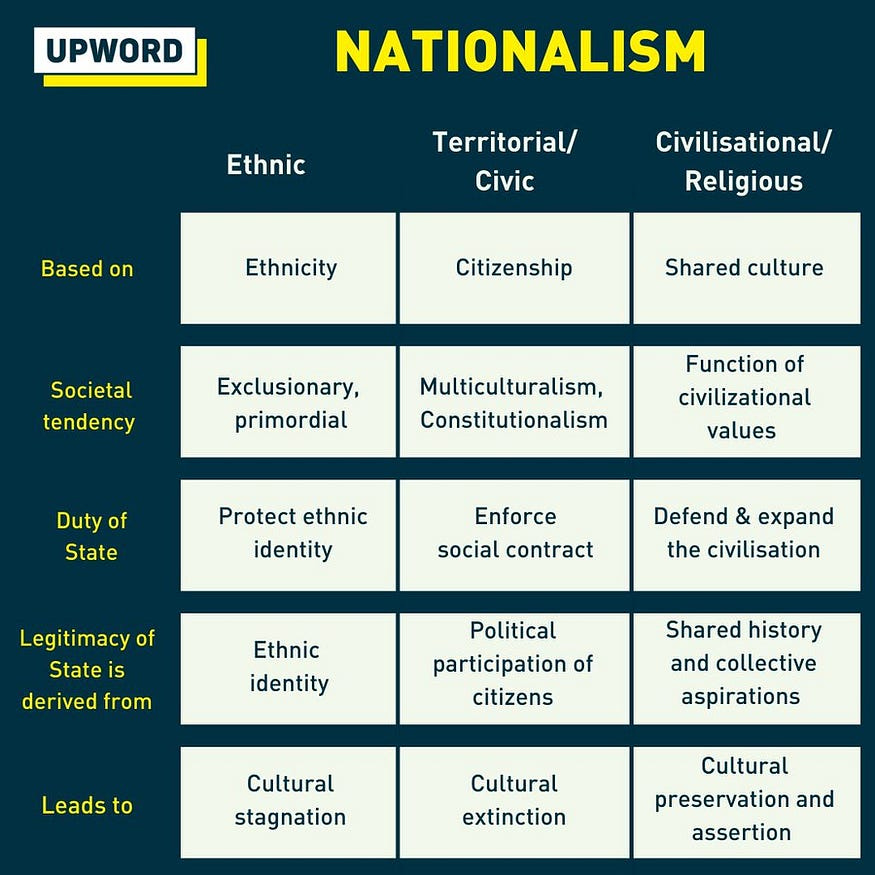
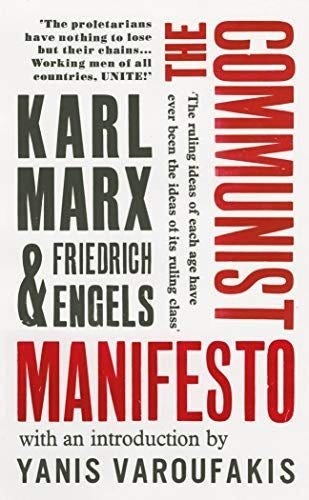
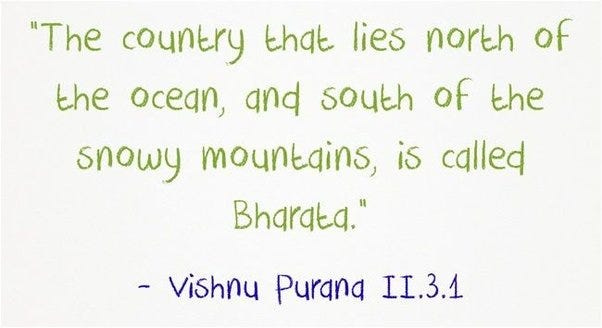
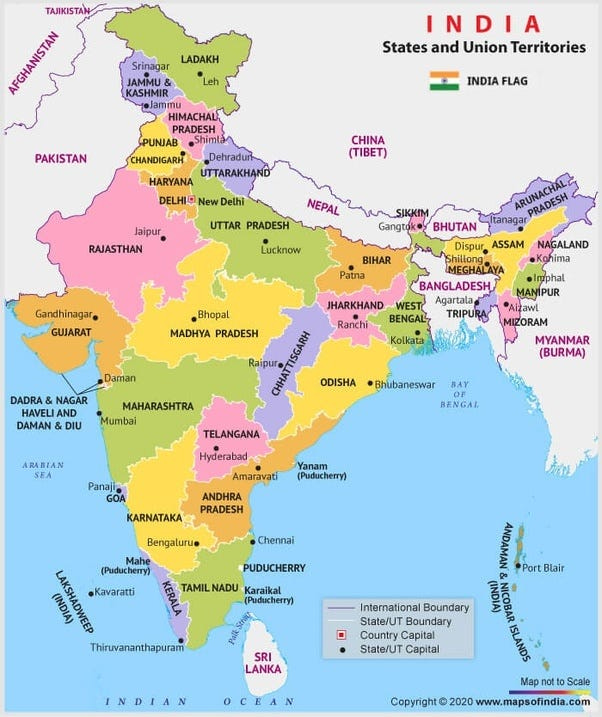
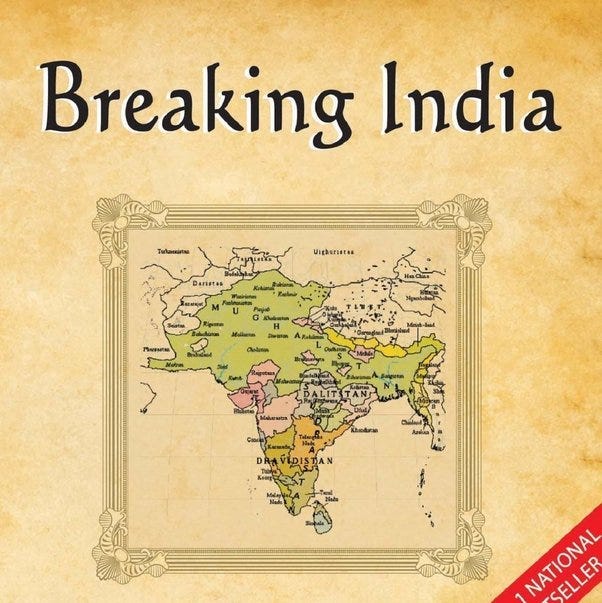
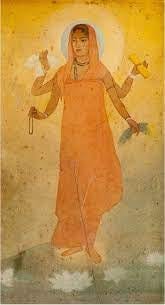
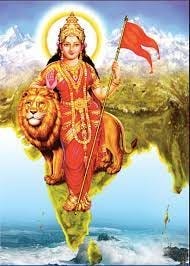
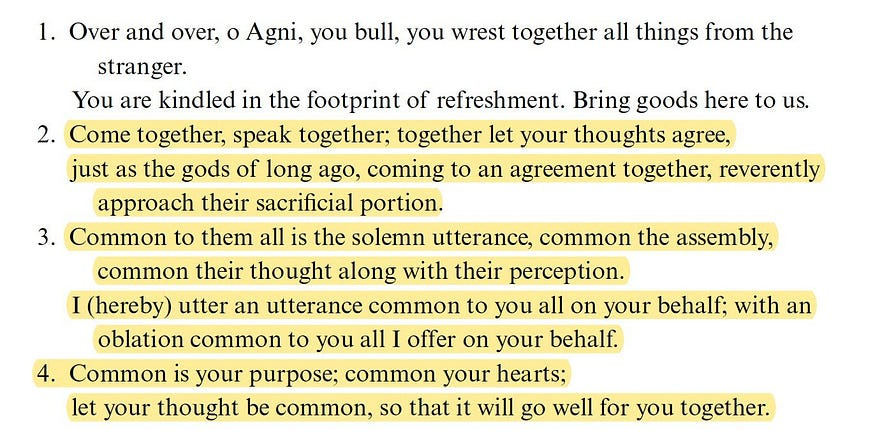
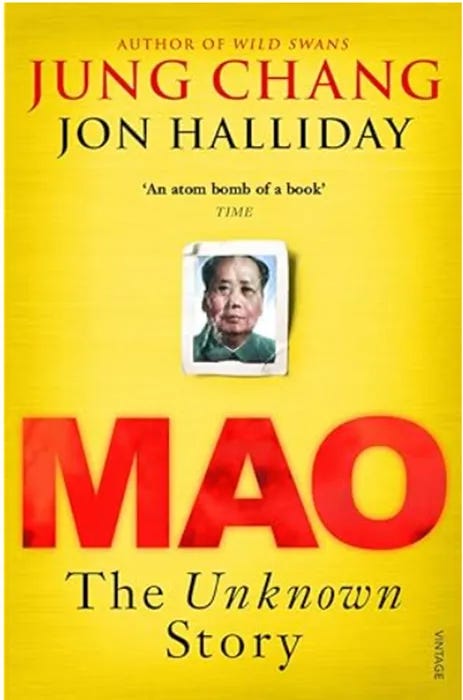
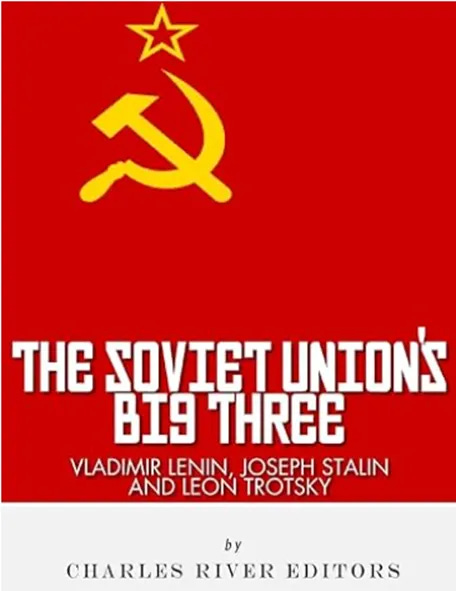

excellent read